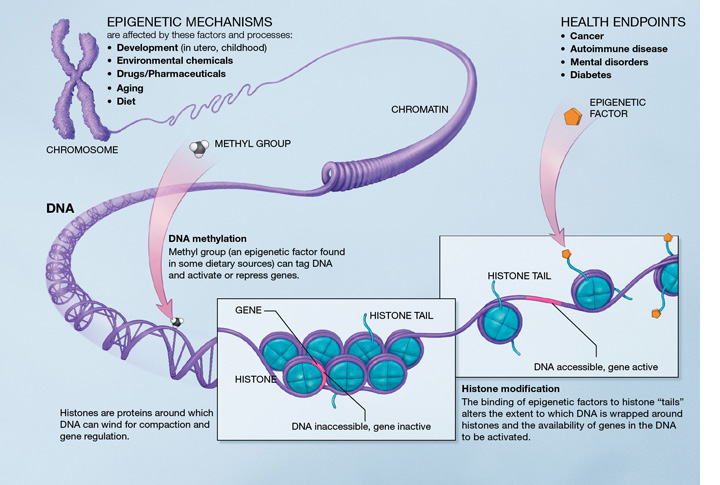| 8:50 - 9:00 AM |
Dr. Del Allen |
Welcome by Dr. Del Allen |
| 9:00 - 9:50 |
Lisa Sardinia |
A Review of the Science of Epigenetics
Why aren't identical twins exactly identical? Why are sons of men who smoked as boys fatter than average? Why did Audrey Hepburn suffer from clinical depression? Epigenetics. A decade of puzzling results has led to our current understanding of this phenomenon. In seeking to answer that eternal question of nature versus nurture – does our upbringing shape us or do our genes? – this field has radically introduced a mysterious third element into the mix: the life experience of previous generations. Epigenetics is a change in our genetic activity without changing our genetic code. Epigenetic tags are responsive to our environment, semi-reversible, and possibly transgenerational. |
| 9:50 - 10:00 |
Break |
|
| 10:00 - 10:50 |
Lisa Sardinia |
Diseases Caused By Epigenetic Changes
Cancer cells divide uncontrollably, often because of altered gene expression. These alterations can be mutations, or they can be epigenetic modifications that change how genes are turned on or off. The role of epigenetics in cancer is a relatively new, but quickly growing field. Now, scientists are beginning to examine the role of epigenetics in other diseases: autism, heart disease, type 2 diabetes and neurodevelopment disorders, among others. Diet and other environmental factors, such as exposure to toxic chemicals may have profound effects on disease development. |
| 10:50 - 11:00 |
Break |
|
| 11:00 - 11:50 |
Mitchell Turker |
Epigenetic Changes Related To Irregular Sleep Patterns
A 24-hour circadian rhythm occurs in mammals in response to the light-dark cycle. During the course of a daily cycle, multiple genes are turned on and off in the brain pacemaker and in peripheral tissues such as the liver, pancreas, and heart. Light controls these daily rhythms by stimulating the brain pacemaker, which then transmits the appropriate signals to the peripheral tissues. In this way, the organism prepares to be active or inactive during the light and dark cycles, respectively, or vice versa for nocturnal animals. Perhaps not surprisingly, problems arise when the normal relation between circadian cues and lifestyle is altered. For example, shift work is associated with increased risk of obesity, cardiovascular disease, diabetes and cancer. In other words, an altered day-night cycle increases the risk for disease. An understanding of the relation between altered circadian rhythm and disease requires an understanding of how the light-dark cycle works and what happens when this cycle is disturbed. Dr. Turker will discuss circadian rhythm from an epigenetics viewpoint and speculate on how and why altered sleep patterns leads to disease. |
| 11:50 - 1:00 |
Lunch |
Make your own sandwich from furnished ingredients along with fruit, veggies, nuts and drink. |
| 1:00 - 1:50 |
Jeffrey Tyner |
Genetic Lesions Driving Cancer Pathogenesis and Progression
I will give an overview of work that is being done to understand genetic lesions responsible for driving cancer pathogenesis and progression as well as efforts to specifically target these genetic lesions in a manner that is tailored to each individual patient's disease. This will include comparisons with prior successes of targeted therapy approaches in other fields, such as infectious disease, and the lessons and parallels that we can bring to bear in the fight against cancer. The seminar will also include a discussion of emerging technologies such as massively parallel ("deep") sequencing and the way in which we can harness these technologies to advance understanding of cancer biology and development of more effective therapies. |
| 1:50 - 2:00 |
Break |
|
| 2:00 - 2:50 |
Lisa Sardinia |
The Role Epigenetics Plays In Some Mental Health Conditions
Schizophrenia is tragically common. It is clear that genetics plays a role (if one of a pair of identical twins develops schizophrenia, there is a 50% chance that the other twin will also develop the condition).
Identical twins have exactly the same genetic code. But neither genetics nor environmental influences are providing a complete answer regarding the other twin. Twins share a womb and often grow up in very similar, if not identical environments. When we consider this, it doesn¹t seem surprising that if one of the twins develops schizophrenia, there is a good chance that his or her twin will also develop the illness. In fact, we have to start wondering why the chances are not higher. Why isn¹t the figure 100 percent? How is it that two apparently identical individuals can become so very different?
Young children who have suffered abuse and neglect may be removed from the abusive situation and placed in another home. Even if they are raised in a loving, supportive environment, these children enter adulthood with a significantly higher risk of depression, self-harm, drug abuse and suicide. Why is it so difficult to override the effects of early childhood exposure to neglect or abuse?
Researchers have not found consistent differences in DNA methylation across the genome, but they have found considerable disease-associated difference at specific sites, altering the expression of specific genes in schizophrenia, bipolar disorder, PTSD, and depression. |
| 2:50 - 3:00 |
Clean up & close down |
Wrap Up and collection of Evaluations |
 Welcome!
Welcome!